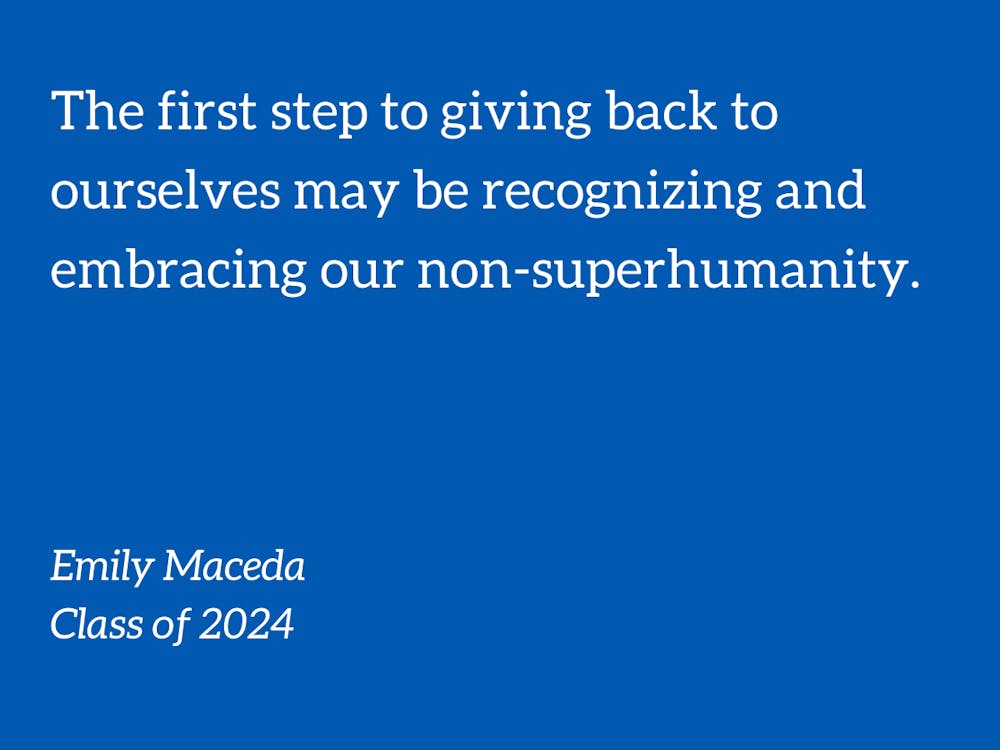We live in a community of superhumans. I don’t mean it in the context of caped people running around saving others from term papers, problem sets and the general subject of Organic Chemistry; though, that would be greatly appreciated.
Instead, I’m referring to the students at Duke who start businesses, invent things, play sports on a national level, work with prominent people and a million other mind-boggling “side projects” all while double majoring, attending parties every weekend and some weekdays and keeping themselves in great physical shape.
I wish I could say those people represent the cream of the crop we all aspire to be, but at times it seems like they’re the “average student”. Duke students succeed and overachieve in any and every aspect of life. They truly are superhuman at times. Superhumans, however, should and need to clock out occasionally.
Clocking out or self-care looks different for everyone. Taking time for yourself could be going to the gym, meditating, reading, sleeping or playing with animals. I’m sure there’s even someone out there in the wide world that considers investing or math problems to be a break from life and its responsibilities. The humanities double major in me would love to meet them one day out of pure curiosity.
Personally, self-care means slapping on a face mask that makes me look like Shrek, watching Spencer and Derek from Criminal Minds and existing as a couch potato for the day. I’m sure some might relate. However, the culture in universities, especially those like Duke’s, can make even the most mindful person feel guilty for taking time to just exist and breathe.
When we stop, the world, unfortunately, doesn’t. Even just a day spent lounging in bed or a morning going for a long brunch can feel like wasted time. We unjustly brand ourselves as lazy or unproductive and banish the “couch potato” self-care activities from calendars packed to the brim with places to be, people to meet and things to do.
For those who do stay strong and take a breather, they look around them and see their friends and peers going on at full speed ahead. The fear of falling behind creeps in. Self-care time slowly decreases. Eventually, it becomes an afterthought.
Even for those who do consistently budget in time, the almost instinctive social fear of being unproductive can creep in. Walking through Wilson, I’ve seen people manage to hike up steep treadmill inclines with a highlighter in one hand and a textbook in the other. Throughout WU, students can be seen sneaking in bites of food with eyes glued to screens.
We often convince ourselves into thinking that we don’t have enough time. There’s no time to carve out thirty minutes or however long when there’s a final, a paper, or a deadline coming up. It becomes an easy excuse to grab onto when pushing self-care on the backburner.
To remain entirely transparent, I’ll admit that I often don’t follow what I advocate for. Staying on top of your mental health during highly pressurized and stressful times or places can seem impossible. Because I have always done it, I trudge ahead with whatever needs to be done and trust that I’ll lug my body and mind intact to the finish line when it’s all over. The problem for many of us is that it will never be over. There will always be that next deadline, promotion or family crisis that will pose an “obstacle” to self-care.
Keep in mind that I’m not advocating or encouraging procrastination. Some may find themselves perpetually using self-care activities as ways to put off stressful or time-sensitive tasks. The time dedicated to mental health mindfulness becomes plagued by anxiety and stress skyrockets when it comes time to do work. Unintentionally using time for yourself in this manner may do more harm than good and lead many to believe that self-care is truly useless.
We get in as much as we put in. The same logic applies to self-productivity, happiness and health. Students here give so much of themselves–their hearts, brains and time–to the various projects and tasks they’ve taken on. Duke students take pride in working hard and playing hard. We give and give time to everyone and everything but ourselves.
Despite being human, we try to sustain a superhuman schedule or expectation in fear of descending into couch potato levels of unproductivity. The first step to giving back to ourselves may be recognizing and embracing our non-superhumanity. Couch potatoes need a home in our community because in their off time superhumans may want time to just exist and breathe.
Emily Maceda is a Trinity sophomore. Her column runs on alternate Thursdays.
Get The Chronicle straight to your inbox
Signup for our weekly newsletter. Cancel at any time.

